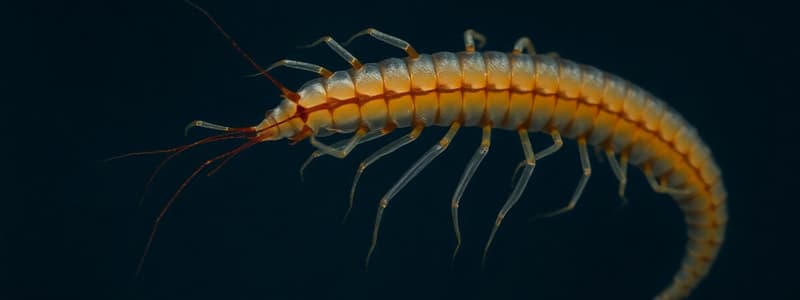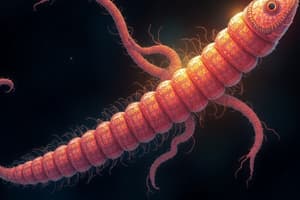Podcast
Questions and Answers
What is the common name for Taenia saginata?
What is the common name for Taenia saginata?
- Beef tapeworm (correct)
- Pork tapeworm
- Fish tapeworm
- Mutton tapeworm
What is a key difference between Taenia solium and Taenia saginata?
What is a key difference between Taenia solium and Taenia saginata?
- Both have identical morphological features.
- Taenia solium is transmitted via fish.
- Only Taenia solium has hooks and a rostellum. (correct)
- Only Taenia saginata has proglottids.
Which of the following is the infective stage for humans in the life cycle of Taenia species?
Which of the following is the infective stage for humans in the life cycle of Taenia species?
- Egg
- Cysticercus larva (correct)
- Proglottid
- Scolex
What is the primary mode of infection for Taenia saginata?
What is the primary mode of infection for Taenia saginata?
What is the structure of the eggs from Taenia species?
What is the structure of the eggs from Taenia species?
Which of the following statements about Taenia species is NOT true?
Which of the following statements about Taenia species is NOT true?
How does the Taenia species larva affect animals after egg ingestion?
How does the Taenia species larva affect animals after egg ingestion?
What symptom is most commonly associated with Taenia spp infection?
What symptom is most commonly associated with Taenia spp infection?
What is the main purpose of the scolex in Taenia species?
What is the main purpose of the scolex in Taenia species?
What are the primary symptoms of Taeniasis infection?
What are the primary symptoms of Taeniasis infection?
What structure surrounds the cysticercus larva?
What structure surrounds the cysticercus larva?
What specific nutrient deficiencies can result from Taeniasis?
What specific nutrient deficiencies can result from Taeniasis?
What is the transmission route for Ascaris lumbricoides?
What is the transmission route for Ascaris lumbricoides?
What is the morphology of fertilized eggs of Ascaris lumbricoides?
What is the morphology of fertilized eggs of Ascaris lumbricoides?
Which feature distinguishes male Ascaris lumbricoides from females?
Which feature distinguishes male Ascaris lumbricoides from females?
What disease is caused by Ascaris lumbricoides?
What disease is caused by Ascaris lumbricoides?
How do chronic Ascaris infections affect child development?
How do chronic Ascaris infections affect child development?
What role do adult worms of Ascaris lumbricoides play in its pathogenicity?
What role do adult worms of Ascaris lumbricoides play in its pathogenicity?
What defines unfertilized eggs of Ascaris lumbricoides?
What defines unfertilized eggs of Ascaris lumbricoides?
What is a significant consequence of nutrient competition by Taenia species?
What is a significant consequence of nutrient competition by Taenia species?
Flashcards
Taenia species
Taenia species
Multi-cellular flat worms, with two clinically important types: Taenia solium and Taenia saginata.
Taenia solium
Taenia solium
A type of tapeworm, commonly known as the pork tapeworm.
Taenia saginata
Taenia saginata
A type of tapeworm, commonly known as the beef tapeworm.
Taenia eggs
Taenia eggs
Signup and view all the flashcards
Scolex
Scolex
Signup and view all the flashcards
Taenia solium scolex
Taenia solium scolex
Signup and view all the flashcards
Cysticercus larva
Cysticercus larva
Signup and view all the flashcards
Taeniasis
Taeniasis
Signup and view all the flashcards
Tapeworm life cycle
Tapeworm life cycle
Signup and view all the flashcards
Proglottids
Proglottids
Signup and view all the flashcards
Nutrient Malabsorption
Nutrient Malabsorption
Signup and view all the flashcards
Ascaris lumbricoides
Ascaris lumbricoides
Signup and view all the flashcards
Fecal-oral transmission
Fecal-oral transmission
Signup and view all the flashcards
Infective stage (Ascaris)
Infective stage (Ascaris)
Signup and view all the flashcards
Ascaris eggs (fertilized)
Ascaris eggs (fertilized)
Signup and view all the flashcards
Ascaris eggs (unfertilized)
Ascaris eggs (unfertilized)
Signup and view all the flashcards
Ascaris adult worms (Morphology) - Female
Ascaris adult worms (Morphology) - Female
Signup and view all the flashcards
Ascaris adult worms (Morphology) - Male
Ascaris adult worms (Morphology) - Male
Signup and view all the flashcards
Ascariasis
Ascariasis
Signup and view all the flashcards
Study Notes
Cestodes
- Multi-cellular worms with a flat appearance
- Phylum: Platyhelminthes, Class: Cestoda
- Intestinal Species: Taenia saginata, Taenia solium, Hymenolepis diminuta, Hymenolepis nana, Dipylidium caninum, Diphyllobothrium latum
- Intestinal-Extraintestinal Species: Echinococcus granulosus
Taenia Species
- Two clinically significant species for humans: Taenia solium and Taenia saginata
- Similar characteristics
- Taenia saginata: Common name: Beef tapeworm; Disease: Taeniasis, beef tapeworm infection
- Taenia solium: Common name: Pork tapeworm; Disease: Taeniasis, pork tapeworm infection
Taenia Species - Morphology (Eggs)
- Eggs of T. solium and T. saginata are indistinguishable
- Roundish shape
- Contain a hexacanth embryo with three pairs of hooklets
- Surrounded by a yellow-brown shell (embryophore)
Taenia Species - Morphology (Scolices & Proglottids)
- Scolices (heads): single scolex
- Primary difference between T. saginata and T. solium: T. solium has a rostellum and hooks, T. saginata lacks these features
- Proglottids contain 4 suckers
- Taenia spp are hermaphrodites
Taenia Species - Life Cycle
- Infection occurs by ingesting raw or undercooked beef ( T. saginata) or pork ( T. solium) contaminated with a cysticercus larva
- Cysticercus larva: infective stage, inverted scolex surrounded by a bladder-like cyst filled with fluid.
- Larva releases in small intestine, scolex attaches to intestinal mucosa, matures into adult worm.
- Adult worm produces eggs, some passed in feces, consumed by animals (e.g., cows or pigs)
- Eggs hatch, larva migrates to tissue, becomes an infective cysticercus larva.
- New cycle begins when humans ingest infected animal meat.
Taenia Species – Clinical Symptoms
- Asymptomatic in most infected individuals
- Taeniasis (Beef or Pork Tapeworm Infection): diarrhea, abdominal pain, significant weight loss, vomiting, nausea
Taenia Species – Nutrient Malabsorption & Deficiency
- Competition for nutrients
- Reduced availability of essential nutrients (carbohydrates, proteins, fats)
- Micronutrient deficiencies (vitamin B12, iron)
- Leads to fatigue, anemia, neurological issues
- Diarrhea and appetite loss contribute to nutrient loss
Nematodes (Roundworms)
- Ascaris lumbricoides
Ascaris lumbricoides – Life Cycle
- Only one host: human (no intermediate host)
- Transmission: fecal-oral
- Infective stage: embryonated egg
- Ingested egg hatches in small intestine; migrates through lungs, trachea, pharynx, then to small intestine
Ascaris lumbricoides – Morphology (Eggs)
- Fertilized Eggs: Rounded to oval, laid by inseminated females, embryonated, infective
- Unfertilized Eggs: Rounded to oval, laid by uninseminated females, non-embryonated, not infective
Ascaris lumbricoides – Morphology (Adult Worms)
- Cylindrical
- Female: longer, straight tail, vulva on the body side.
- Male: Curved tail, pair of equal-sized copulatory spicules.
Ascaris lumbricoides – Pathogenicity (Adult Worms)
- Scariasis, caused by both adult worms and migrating larvae
- Severe malnutrition, including vitamin A deficiency, night blindness.
- Growth retardation, intestinal obstruction (heavy infection)
Ascaris lumbricoides – Pathogenicity (Larvae)
- Loeffler's syndrome
- inflammation, hypersensitivity, irritation and wheezing due to larval migration to lungs.
Studying That Suits You
Use AI to generate personalized quizzes and flashcards to suit your learning preferences.
Related Documents
Description
Explore the world of Cestodes, focusing on the Taenia species, including their morphology, life cycle, and clinical significance in humans. Learn about the differences between Taenia solium and Taenia saginata, and their role in taeniasis. This quiz is perfect for students of parasitology and veterinary medicine.




